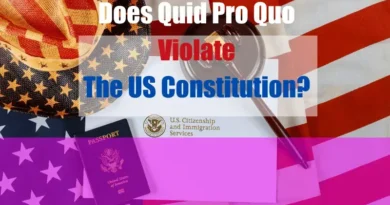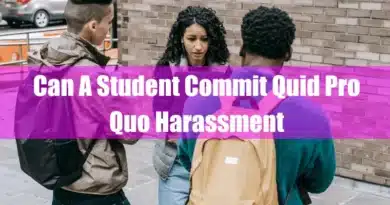What is the Definition of Quid Pro Quo Harassment?
Takeaways
| Key Points |
|---|
| Quid pro quo harassment is a form of sexual harassment where someone in a position of power, such as a supervisor or authority figure, demands sexual favors in exchange for benefits or to avoid negative consequences. This can occur in both workplace and educational settings. |
| In the workplace, quid pro quo harassment happens when a supervisor or manager offers job-related advantages—like a promotion, raise, or other benefits—or threatens negative actions, such as demotion or termination, based on the acceptance or rejection of sexual advances. This is a violation of U.S. law under Title VII of the Civil Rights Act of 1964, which prohibits workplace discrimination based on sex. |
| In educational settings, quid pro quo harassment is similarly prohibited under Title IX of the Education Amendments of 1972. It occurs when someone with authority, like a professor or school administrator, conditions academic benefits—such as grades, recommendations, or access to opportunities—on submission to unwelcome sexual conduct. This creates a hostile and unfair learning environment and is illegal under Title IX. |
| In both cases, the harassment involves a clear connection between the person’s compliance with sexual demands and their employment or educational status, opportunities, or conditions. The core of quid pro quo harassment is the abuse of power, where refusing to comply with sexual demands can lead to significant negative consequences. |
Introduction to Quid Pro Quo Harassment
Quid pro quo harassment is a specific type of sexual harassment that occurs when a person in authority, such as a supervisor or teacher, demands sexual favors in exchange for job-related or educational benefits or threatens negative consequences if the person does not comply. The Latin term quid pro quo translates to “this for that,” which accurately reflects the coercive nature of this behavior, where an exchange of sexual acts for benefits or avoidance of punishment is central to the harassment. This form of harassment is illegal in the United States under various federal laws, including Title VII of the Civil Rights Act of 1964 and Title IX of the Education Amendments of 1972.
Legal Definition and Framework

Title VII of the Civil Rights Act of 1964
Under Title VII, quid pro quo harassment is considered an employment discrimination violation based on sex. This law applies to workplaces across the United States, covering both private and public employers. Quid pro quo harassment happens when submission to unwelcome sexual advances or conduct is explicitly or implicitly made a condition for employment-related decisions such as hiring, firing, promotions, or other job benefits. Title VII categorizes this type of harassment as discriminatory because it places an employee in an unfair position, where their job security or career growth depends on their response to sexual demands.
For example, if a supervisor implies that an employee will only get a promotion if they engage in sexual activity or if the employee’s refusal results in demotion or termination, this would constitute quid pro quo harassment under Title VII. The key element in such cases is the power imbalance between the harasser (typically a supervisor) and the victim (an employee), with employment consequences hanging on the victim’s submission or rejection of the harasser’s demands.

Title IX of the Education Amendments of 1972
In educational settings, quid pro quo harassment is similarly prohibited under Title IX. Title IX specifically addresses discrimination based on sex in any educational program or activity that receives federal financial assistance. Quid pro quo harassment in schools or universities involves someone in authority—such as a professor, coach, or school administrator—who conditions access to educational benefits on the student’s submission to sexual demands. This could involve giving a higher grade in exchange for sexual favors or threatening academic penalties if the student does not comply.
Title IX ensures that students are not subjected to discriminatory behavior that could negatively affect their educational experience. When an educator makes an unwelcome request for sexual conduct in exchange for academic advantages or to avoid penalties, this not only affects the individual student but also disrupts the learning environment, making it unfair and hostile.
Key Characteristics of Quid Pro Quo Harassment
- Power Imbalance: The harasser typically holds a position of authority over the victim, such as a supervisor or teacher. The harasser’s role gives them control over the victim’s job conditions or educational outcomes.
- Explicit or Implicit Demands: Quid pro quo harassment often involves either explicit statements or implied suggestions that sexual favors are required for benefits such as a promotion, a raise, a favorable grade, or continued employment.
- Unwelcome Conduct: The conduct must be unwelcome by the victim. This distinguishes quid pro quo harassment from consensual relationships between individuals of different power levels.
- Employment or Academic Consequences: A critical component of quid pro quo harassment is the link between the harassment and a tangible employment or academic action. This means the victim’s response to the sexual advances has a direct effect on their career, job status, or academic standing.
Legal Recourse for Victims
Victims of quid pro quo harassment have several avenues for legal recourse:
Filing a Complaint with the EEOC (Equal Employment Opportunity Commission)
Under Title VII, employees can file a complaint with the EEOC if they believe they have been subjected to quid pro quo harassment. The EEOC will investigate the claim and may attempt to mediate a settlement between the employee and employer. If the case is not resolved through mediation, the EEOC may take further action depending on the investigation’s findings. If the EEOC determines there is enough evidence to support the claim, it can either file a lawsuit on the employee’s behalf or issue a ‘Notice of Right to Sue.’ This notice allows the employee to file a lawsuit independently, typically within 90 days of receiving the notice. However, it is important to note that the EEOC is selective in choosing cases to litigate on behalf of employees and may prioritize cases with broader public interest implications.
Filing a Complaint Under Title IX

In educational institutions, students can file a complaint with the U.S. Department of Education’s Office for Civil Rights (OCR). The OCR investigates allegations of quid pro quo harassment and can enforce penalties on the institution, typically requiring corrective actions. In rare and extreme cases where the institution fails to comply with Title IX regulations, it may face the loss of federal funding.
Lawsuits
In both workplace and educational settings, victims can file lawsuits in federal court to seek damages for the harm caused by the harassment. Successful lawsuits can lead to monetary compensation, reinstatement of lost job opportunities, or academic accommodations.
Regarding damages in private and public sector harassment lawsuits:
- In private sector lawsuits under Title VII of the Civil Rights Act, victims of harassment can seek compensatory damages for emotional distress, medical expenses, and job-related costs, as well as punitive damages if the employer acted with malice or reckless indifference. Depending on the employer’s size, there are caps on the combined total of compensatory and punitive damages, ranging from $50,000 to $300,000.
- In contrast, under Title VII, punitive damages are not allowed for government sector employees in cases involving federal, state, or local governments. However, if they win their case, they can still seek compensatory damages, back pay, front pay, and attorneys’ fees.
Conclusion
Quid pro quo harassment is a serious violation of both Title VII and Title IX, as it exploits power imbalances to coerce victims into unwanted sexual conduct. The impact on victims can profoundly affect their career or academic success. Laws like Title VII and Title IX are in place to protect individuals from such abuse, and legal remedies are available to hold perpetrators accountable. Preventing quid pro quo harassment requires vigilance, education, and a commitment to maintaining respectful, equitable environments in both the workplace and educational settings.
FAQ
What is quid pro quo harassment in legal terms?
Quid pro quo harassment refers to situations where submission to or rejection of unwelcome sexual conduct by an individual is used as the basis for employment decisions affecting that individual. This form of harassment typically involves a person in authority demanding sexual favors in exchange for job benefits or to avoid job detriments. It is recognized under Title VII of the Civil Rights Act of 1964 as a form of sex discrimination.
How does quid pro quo harassment differ from a hostile work environment?
Quid pro quo harassment involves explicit or implicit conditions placed on employment based on submission to sexual advances, leading to tangible employment actions. In contrast, a hostile work environment involves unwelcome conduct that is severe or pervasive enough to create an intimidating or offensive work environment without necessarily resulting in tangible employment actions.
What constitutes a “tangible employment action” in quid pro quo harassment cases?
A tangible employment action refers to a significant change in employment status, such as hiring, firing, promotion, demotion, or reassignment with significantly different responsibilities. In Burlington Industries, Inc. v. Ellerth, the Supreme Court stated that tangible employment actions are official acts of the enterprise.
Can a single incident constitute quid pro quo harassment?
Yes, a single incident can constitute quid pro quo harassment if it involves a supervisor making sexual advances and linking the employee’s response to a tangible employment action. For instance, in Williams v. Saxbe, the Court found that a supervisor’s single proposition for sexual favors in exchange for job retention constituted quid pro quo harassment.
Is the employer automatically liable for quid pro quo harassment by a supervisor?
Generally, employers are held strictly liable for quid pro quo harassment perpetrated by supervisors, as supervisors are considered to be acting on behalf of the employer when making employment decisions contingent on sexual favors.
What defenses can an employer raise against a quid pro quo harassment claim?
In quid pro quo cases, employers have limited defenses. They may argue that the alleged harassment did not occur, that the actions were not unwelcome, or that the supervisor did not have authority over the employee. However, if a tangible employment action resulted from the harassment, the employer is typically held vicariously liable.
Does the harasser need to state the quid pro quo arrangement explicitly?
No, the quid pro quo arrangement can be implied. The key factor is whether the employee reasonably perceives that submission to sexual advances is a condition for receiving job benefits or avoiding job detriments. In Burlington Industries, Inc. v. Ellerth, the Court noted that even unfulfilled threats can contribute to a hostile work environment claim.
Can quid pro quo harassment occur if the employee acquiesces to the supervisor’s demands?
Yes, even if an employee submits to a supervisor’s sexual demands, it can still constitute quid pro quo harassment. The submission does not negate the coercive nature of the demand or the abuse of power inherent in the situation. The critical issue is whether the submission was truly voluntary or a result of perceived pressure.
Are employers liable for quid pro quo harassment if they were unaware of the supervisor’s actions?
Yes, employers are typically held liable for quid pro quo harassment by supervisors, regardless of whether they were aware of the actions. This is because supervisors are considered employer agents, and their actions in making employment decisions bind the employer.
Can a consensual relationship between a supervisor and subordinate negate a quid pro quo harassment claim?
A prior consensual relationship does not preclude a quid pro quo harassment claim. If, after the relationship ends, the supervisor makes employment decisions contingent upon resuming the relationship or retaliates against the subordinate for ending it, it can constitute quid pro quo harassment.
What role does the Equal Employment Opportunity Commission (EEOC) play in quid pro quo harassment cases?
The EEOC enforces federal laws prohibiting employment discrimination, including quid pro quo harassment. They investigate complaints, mediate disputes, and can file lawsuits on behalf of employees. The EEOC’s guidelines define quid pro quo harassment and outline employer responsibilities in preventing and addressing it.
How has the legal understanding of quid pro quo harassment evolved over time?
The legal understanding of quid pro quo harassment has evolved through landmark cases. In Barnes v. Train (1974), one of the first cases to address the issue, the Court recognized that firing an employee for refusing a supervisor’s sexual advances constituted sex discrimination. Subsequent cases, such as Williams v. Saxbe (1976) and Meritor Savings Bank v. Vinson (1986), further clarified the definitions and employer liabilities associated with quid pro quo harassment.
Can quid pro quo harassment occur during the hiring process?
Yes, quid pro quo harassment can occur during the hiring process. If a hiring manager conditions a job offer on the applicant’s submission to sexual advances or favors, it constitutes quid pro quo harassment. Applicants are protected under Title VII from such discriminatory practices.
What remedies are available to victims of quid pro quo harassment?
Victims of quid pro quo harassment may be entitled to remedies, including reinstatement to their position, back pay, compensatory damages for emotional distress, and punitive damages if the employer acted with malice or reckless indifference to their rights.
How can employers prevent quid pro quo harassment in the workplace?
Employers can prevent quid pro quo harassment by implementing comprehensive anti-harassment policies, providing regular training to employees and supervisors, establishing clear reporting procedures, and promptly investigating and addressing any harassment complaints. Creating a workplace culture that does not tolerate harassment is essential in preventing such conduct.









